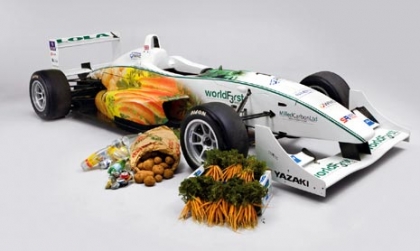This post was submitted by guest contributor Matthew Heatherington, a PR executive with Life Agency.
The steering wheel is made from carrots, the engine is powered by waste chocolate and vegetable oil, potatoes were used to help produce the bodywork… and it goes 125 mph round corners!
Following the recent turmoil in Formula 1 arising from the high costs of running competitive motor racing teams, and doubts in sponsors’ minds over the commercial value of their involvement, the viability of motor racing is being critically questioned.
With this in mind, the Warwick Innovative Manufacturing Research Centre (WIMRC), part of the University of Warwick, is seeking to prove to the motor industry that it is possible to build a competitive racing car using environmentally sustainable components.
The new WorldFirst racecar is a clever piece of lateral thinking. It is the first Formula 3 racing car designed and made from sustainable and renewable materials.
Components made from plants form the mainstay of the car’s make up, including a race spec steering wheel derived from carrots and other root vegetables, a flax fibre and soybean oil foam racing seat, a woven flax fibre bib, plant oil based lubricants and a bio diesel engine configured to run on fuel derived from waste chocolate and vegetable oil. It also incorporates a radiator coated in a ground-breaking, emission-destroying catalyst.
As original equipment manufacturers focus on decreasing engine emissions to meet future CO2 legislation, the WorldFirst project proves that if you are going to wholeheartedly embrace the ‘green is great’ ethos, rather than merely posture, you have to broaden your vision. This must encompass a strategy that stretches throughout the car’s life cycle, from raw materials to final disposal. The project clearly demonstrates that automotive environmentalism can and should be about the whole package.
According to Project Manager James Meredith, a researcher in WMG at the University of Warwick, “It’s been very exciting working on the project and important for our team to develop a working example of a truly ‘Green’ motor racing car. The WorldFirst project expels the myth that performance needs to be compromised when developing the sustainable motor vehicles of the future.”
Image Credit: Life Agency

